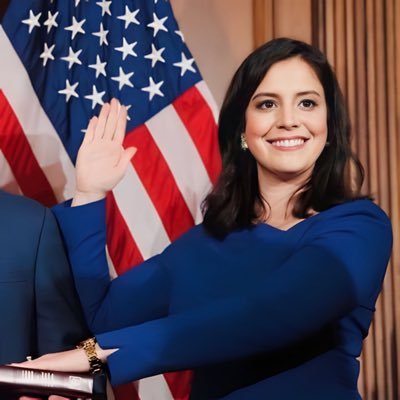Elise Stefanik, the Republican U.S. Representative from New York’s 21st district, was poised for a major career shift when President Donald Trump nominated her on November 11, 2024, to serve as U.S. Ambassador to the United Nations in his second term.
Known for her loyalty to Trump and her rise to House Republican Conference Chair, Stefanik’s nomination marked a potential exit from Congress after a decade of service. However, as of March 27, 2025, that transition was scrapped, with Stefanik opting to stay in the House after Trump withdrew her nomination.
Now, Trump has asked Rep. Elise Stefanik to remain in Congress due to the precarious state of the Republican House majority, which currently stands at 218-214. This urgency is driven by vulnerabilities tied to two specific Florida seats: FL-6, vacated by Mike Waltz (Trump’s National Security Adviser pick), and FL-11, left open by Matt Gaetz (who briefly was Trump’s Attorney General nominee before withdrawing).
Special elections for these districts are scheduled for April 1, 2025. Although both are strongly Republican—Trump carried FL-6 by 30 points and FL-11 by a comparable margin—recent developments have sparked concern. A surprising Democratic upset in a Pennsylvania special election earlier in March 2025, combined with unexpectedly close polling in Florida, has rattled the GOP.
Wall is struggling to keep friends in MAGA-world, firstly due to his neocon roots, secondly due to the Signal-gate error and subsequent lies, and now due to the fact that his old Congressional seat in Florida’s 6th district is now polling within the margin of error. This FL-6 race has tightened, prompting Trump to hold a tele-town hall to support Republican candidate Randy Fine. If either seat flips, the GOP’s razor-thin majority could shrink even further, making Stefanik’s presence in the House critical. Her vote is seen as essential to maintaining control and pushing Trump’s agenda, especially with these risks looming, leading him to urge her to stay rather than take the U.N. ambassador role.
The Nomination
Stefanik’s journey to the U.N. began shortly after Trump’s 2024 re-election. A vocal supporter during his 2019 impeachment and one of his earliest 2024 endorsers, she was hailed by Trump as a “strong, tough, and smart America First fighter.” Her nomination hinted at a new chapter, with Stefanik set to vacate her House seat—potentially triggering a special election in her Republican stronghold—and take on a prominent diplomatic role.
The confirmation process kicked off in January 2025. On January 21, Stefanik faced the Senate Foreign Relations Committee, pledging to combat antisemitism, bolster support for Israel and Taiwan, counter China’s influence, and push for U.N. reform. The committee approved her by voice vote on January 30, reflecting bipartisan backing. But the full Senate vote never came. With the GOP clinging to a 218-213 House majority (plus four vacancies), her departure risked weakening the party’s grip on Congress.
A Strategic Retreat
On March 27, 2025, Trump pulled the plug. In a Truth Social post, he explained that losing Stefanik’s seat in a special election—however unlikely in her deep-red district—could derail his agenda, from tax cuts to border security. “Others can do a good job at the United Nations,” he wrote, urging her to stay in Congress and rejoin House leadership. Stefanik agreed, calling herself a “team player” on Fox News that night. Speaker Mike Johnson welcomed her back, promising a leadership role, though her exact position remains TBD after stepping down as Conference Chair.
From Moderate to MAGA—and Back to the House
Stefanik’s near-switch reflects her evolution from a moderate Republican elected in 2014 to a MAGA stalwart. While her U.N. stint didn’t pan out, the episode highlights the GOP’s razor-thin margins and strategic priorities. For now, she remains a congressional fixture, her diplomatic ambitions shelved for party unity.
